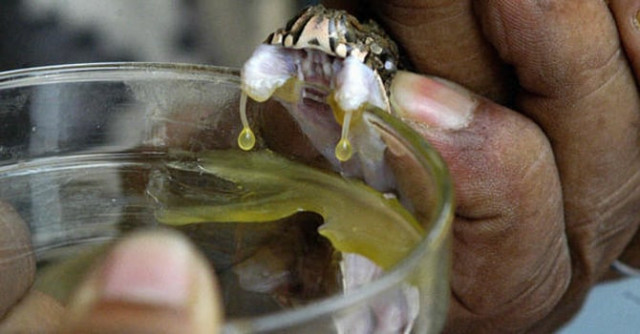Anti-snake venom: Shortage of vaccines poses threats to Tharis
Health officers say they have to import costly vaccines from India.

Price difference: 1,200 rupees is the cost per vial of anti-snake venom in Pakistan and in India, the price ranges
from Rs1,000 to Rs2,000. PHOTO: AFP/FILE
Snake bites have caused multiple deaths in the area over the years but some people have been lucky enough to stay alive due to timely medication. One or two doses of the anti-snake venom (ASV) vaccines prevent patients from suffering the neurotoxic and cardiotoxic effects of the snake poison.
During the last three months, more than 1,300 cases of snake bites were reported in Thar’s government hospitals and centres of People Primary Healthcare Initiative (PPHI), according to the data obtained from the district health office. More than 900 cases were reported at the health department’s hospitals while over 400 were received by the PPHI centers in the district. At least one death, of Rai Chand Bheel in Mithi tehsil, has been officially confirmed while there were reports of four other deaths.

According to assistant district health officer, Dr Prabhu Lal, the number of snake bites’ cases usually increase during July and August. “While we are likely to receive almost double the number of cases, we are running short of the ASVs due to suspension of supply from the manufacturer.”
Shortage of life-savers
In Pakistan, the National Institute of Health (NIH), Islamabad, is the only manufacturing facility of the ASV vaccines. The hospitals in Thar and all the other districts in Sindh procure the vaccinations from NIH. But the institute has not been supplying vaccinations for at least last six months, leaving the buyers with the only option of importing it - mostly from India. “The vaccines imported from India are not only expensive but they are far less efficacious. A patient has to be administered six to eight doses instead of one or two which we do with the Pakistani version,” Dr Heera Lal Chand, who works for a non-profit organisation Thar Deep in Thar, told The Express Tribune.
According to him, the Pakistani ASV costs around Rs1,200 per vial while the Indian one is priced anywhere between Rs1,000 to Rs2,000. Thar Deep, he added, buys 200 to 500 vials every year which are later sold to the government hospitals when they run out of supply. “But at the moment, we are only left with the stock hardly enough for our organisation’s staff - between eight to ten vials.” He claimed that his organisation placed procurement order to the NIH at least five months ago but were still awaiting delivery. Usually, he added, it takes around a month for consignment’s delivery.
Thar DHO Dr Abdul Wahab Wadhyo said that his office too had placed an order for 4,000 vials, at the rate of Rs1,200 per vial, from the NIH in March but were told that due to some technical problem, the production has been either halted or reduced. “We waited for three months to get the ASVs from NIH but then in June we procured 2,000 vials from India through a tender. Currently, we have less than 700 doses left in our stock which is too few for the number of cases we expect to receive.”
Similarly, the PPHI’s in charge, Dr Riaz Jakhrani, also said they have no stock of ASV left to cure the patients, citing same reasons for the situation. An official of NIH, Dr Nasreen Noorani, said that the supply will be restored after at least two months. Although she confirmed the production halt due to a technical problem, she refused to share details of the fault.
Published in The Express Tribune, July 20th, 2013.



















COMMENTS
Comments are moderated and generally will be posted if they are on-topic and not abusive.
For more information, please see our Comments FAQ